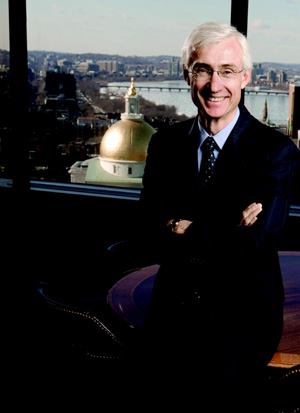- What: Multifamily investment management firm that acquires, redevelops, owns, and operates apartments in major markets from Baltimore to Seattle
- Founded: 1969 by Douglas and George Krupp
- Headquarters: Boston (corporate), Atlanta (property management), and Dallas (rehab and renovation)
- Leadership: Frank Apeseche, CEO; David Olney, chief investment officer; David Quade, CFO; Tom Shuler, COO, property management
- Portfolio: 20,532 units (as of December 2006)
- 2007 Revenue: $174 million (projected)
- Employees: 560
Online:www.berkshireapartments.comPROPERTY PARTNERSAt Berkshire, property managers get authority and respect.
From the very beginning, Berkshire leadership has sought the on-site insight of its property managers. “Whenever [founder] George [Krupp] came into town, he wanted to hear from the manager. He’d look at leases alone, but he paid an interest in the on-site manager,” says regional manager Cathy Robinson, a one-time Berkshire property manager who has now logged 15 years with the firm. “He wanted to know what was happening at the property.”
That attitude continues today at Berkshire, where property and district managers are considered an integral part of the business, from acquisitions to operations. “We’re trying to push the value-chain concept as deep into the organization as we can,” explains division vice president Dean Holmes. “We’re trying to create a sense of ownership in the asset.”
So on-site staff participate in due diligence on potential deals. They set their own rents, without the assistance of revenue management software. They renovate test units to see if the changes could drive rents. “This company is not shy about giving you $100,000 to test” potential rent boosters, says Zach Maggart, Berkshire’s vice president of redevelopment.
Such autonomy gives Berkshire property managers, whose tenure is typically between eight and nine years, a decision-making confidence often lacking in property managers at other apartment firms. At property after property, Berkshire managers greet company leaders by name, taking advantage of the visit to propose upgrades—six-panel doors, for example—that they believe will improve the property’s NOI. They know they are responsible for the value of their properties, and they welcome the challenge.
“We’ve created an acquisition model that allows everyone to speak the same language,” Holmes says. “We have demystified acquisitions and allowed them to see how their operational decisions affect the value of the asset.”
LEADERSHIP LESSONS: FRANK APESECHE
- Title: CEO and senior partner, Berkshire Property Advisors
- Age: 49
- First job: Consultant at Accenture (formerly Andersen Consulting)
- Best business decision: Spending the time and suppressing my personal ego to form a partnership structure at Berkshire. We would have never been able to accomplish what we have without a true shared leadership model.
- Best advice received: Your best assets leave the building each night. Your job is to make sure they look forward to returning the next day.
- Favorite quote: “Good is the enemy of great.” —Jim Collins, author of Good to Great
Golden Opportunities
Berkshire Property Advisors maximizes value from top to bottom.
10 MIN READ

VIEW FROM THE TOP: From Berkshire's Boston offices, CEO Frank Apeseche can see the Massachusetts State House and beyond.
BERKSHIRE PROPERTY ADVISORS